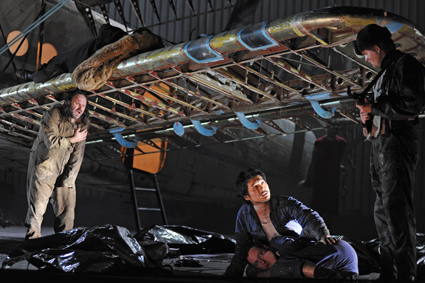After seeing a video excerpt from the Met’s Patrice Chéreau production of From the House of the Dead, I was struck by the cleanness of it all, the sets, the costumes, the tastefully muted colors, and the direction. No doubt it is moving, in its way, but is it relevant? It looks like generic suffering in a nameless prison far, far away — in time, especially.
In contrast, Calixto Bieito’s production of this opera at Oper Basel is more Gitmo than Gulag, more Sing Sing than Solovki, more Riker’s Island than Russian camp.
Over the opening bars, a prison soccer game is in progress. The prisoners are dirty, but each has his own sense of fashion individuality — the necessary antidote to a collective destiny. The eagle is an airplane, a real one, which slowly descends into the prison yard, making an emergency landing. It is the symbol of escape and yet it doesn’t function. As metaphor it will haunt and taunt the prisoners for the rest of their days.
Where Cheréau’s version is bleakly austere, Bieito’s is bleakly rich at all times, and sometimes even bleakly funny, as it is when the prisoner’s perform for each other wearing cardboard boxes or homemade scrap metal dildos; or bleakly poetic, such as the biplane as a magnificent dodo bird going nowhere.
There are no women in this production. One senses that this group of men, broken people surrounded by broken things, is an explosive mix, their dreams and memories the Semtex waiting to go off. Bieito’s prisoners live in a limited anarchy: they are free to dream and remember, to perform and applaud, to fight and to lose, but no more. Bieito knows how to move his cast to the music, and move his audience at the same time.
There are terrifying moments: when a group of men is rounded up and shot against the back wall of the prison yard, the other prisoners simply ignore the event. It was to be expected. This time, it wasn’t them.



